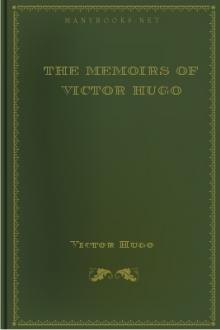Hilda Lessways by Arnold Bennett (some good books to read txt) 📕

- Author: Arnold Bennett
Book online «Hilda Lessways by Arnold Bennett (some good books to read txt) 📕». Author Arnold Bennett
IV
"Here we are!" said George Cannon jauntily, as the carriage stopped in front of No. 59 Preston Street. But his jauntiness seemed factitious. The demeanour of all three was diffident and unnatural, for now had arrived the moment when George Cannon had to submit his going concern to the ordeal of inspection by the women, and especially by Sarah Gailey. There the house stood, a physical fact, forcing George to justify it, and beseeching clemency from the two women. The occasion was critical; therefore everybody had to pretend that it was a perfectly ordinary occasion, well knowing the futility of the pretence. And the inevitable constraint was acutely aggravated by Sarah's silent and terrible reception of the news concerning the Boutwoods.
While George Cannon was paying the driver, Sarah and Hilda hesitated awkwardly on the pavement, their hands occupied with small belongings. They had the sensation of being foreigners to the house; they could not even mount the steps without his protection; scarcely might they in decency examine the frontage of the house. They could not, however, avoid seeing that a workman was fixing a new and splendid brass-plate at the entrance, and that this plate bore the words, "Cannon's Boarding- house." Hilda thought, startled: "At last he is using his own name!"
He turned to them.
"You have a view of the sea from the bow-window of the drawing-room--on the first floor," he remarked.
Neither Hilda nor Sarah responded.
"And of course from the other bow-window higher up," he added, almost pitifully, in his careful casualness.
Hilda felt sorry for him, and she could not understand why she felt sorry, why it seemed a shame that he should be mysteriously compelled thus to defend the house before it had been attacked.
"Oh yes!" she murmured foolishly, almost fatuously.
The street and the house were disappointing. After the grandeur of the promenade, the street appeared shabby and third-rate; it had the characteristics of a side street; it was the retreat of those who could not afford anything better, and its base inhabitants walked out on to the promenade and swaggeringly feigned to be the equals of their superiors. The house also was shabby and third-rate--with its poor little glimpse of the sea. Although larger than the Cedars, it was noticeably smaller and meaner than any house on the promenade, and whereas the Cedars was detached, No. 59 was not even semi-detached, but one of a gaunt, tall row of stuccoed and single-fronted dwellings. It looked like a boarding-house (which the Cedars did not), and not all the style of George Cannon's suit and cane and manner, as he mounted the steps, nor the polish of his new brass-plate, could redeem it from the disgrace of being a very ordinary boarding-house.
George Cannon had made a serious mistake in bringing the carriage round by the promenade. True, he had exhibited the glory of Brighton, but he had done so to the detriment of his new enterprise. That No. 59 ought to be regarded as merely an inexpensive field for the acquiring of preliminary experience did not influence the judgment of the women in the slightest degree. For them it was a house that rightly apologized for itself, and whose apologetic air deserved only a condescending tolerance.
The front door stood open for the convenience of the artisan who was screwing at the brass-plate. He moved aside, with the servility that always characterizes the worker in a city of idlers, and the party passed into a long narrow hall, whose walls were papered to imitate impossible blocks of mustard-coloured marble. The party was now at home.
"Here we are!" said Hilda, with a gaiety that absolutely desolated herself, and in the same instant she remembered that George Cannon had preceded her in saying 'Here we are!' She looked from the awful glumness of Sarah Gailey to the equally awful alacrity of George Cannon, and felt as though she had committed some crime whose nature she could not guess.
A middle-aged maid appeared, like a suspicious scout, at the far end of the hall, beyond the stairs, having opened a door which showed a glimpse of a kitchen.
"That tea ready?" asked George Cannon.
"No, sir," said the maid plumply.
"Well, let it be got ready."
"Yes, sir." The maid vanished, flouncing.
Sarah Gailey, with a heavy sigh, dropped her small belongings on to a narrow bare table that stood against the wall near the foot of the stairs. Daylight was fading.
"Well," said George Cannon, balancing his hat on his cane, "your luggage will be here directly. This is the dining-room." He pushed at a yellow-grained door.
The women followed him into the dining-room, and stared at the dining- room in silence.
"There's a bedroom behind," he said, as they came out, and he displayed the bedroom behind. "That's the kitchen." He pointed to the adjoining door.
"The drawing-room's larger," he said. "It includes the width of the hall."
They climbed the narrow stairs after him wearily. The door of the drawing-room was ajar, and the chatter of thin feminine voices could be heard within. George Cannon gave a soundless warning whisper: "The Watchetts." And Sarah Gailey frowned back the information that she did not wish to meet the Watchetts just then. With every precaution against noise, George Cannon opened two other doors, showing bedrooms. And then, as it were, hypnotized by him, the women climbed another flight of narrow stairs, darkening, and saw more rooms, and then still another flight, and still more rooms, and finally the boasted view of the sea! After all, Hilda was obliged to admit to herself that the house was more impressive than she had at first supposed. Although single-fronted, it was deep, and there were two bedrooms on the first floor, and four each--two large and two small--on the second and third. Eleven in all, they had seen, of which three were occupied by the Watchetts, and one, temporarily, by George Cannon. The rest were empty; but the season had scarcely begun, and the Boutwoods were coming. George Cannon had said grandly that Hilda must choose her room; she chose the smallest on the top floor. The furniture, if shabby and old-fashioned, was everywhere ample.
They descended, and not a word had been said about Sarah's room.
On the first-floor landing, where indeed the danger was acutest, they were trapped by two of the Watchetts. These elderly ladies shot almost roguishly out of the drawing-room, and by their smiles struck the descending party into immobility.
"Oh! We saw you arrive, Mr. Cannon!" said the elder, shaking her head. "So this is Miss Gailey! Good afternoon, Miss Gailey! So pleased to make your acquaintance!"
There was handshaking. Then it was Hilda's turn.
"We're so sorry our eldest sister isn't here to welcome you to No. 59," said the younger. "She's had to go to London for the day. We're very fond of No. 59. There's no place quite like it, to our minds. And we're quite sure we shall be quite as comfortable with dear Miss Gailey as we were with dear Mrs. Granville, poor thing. It was quite a wrench when we had to say good-bye to her last night. Do come into the drawing-room, please! There's a beautiful view of the sea!"
Sarah Gailey hesitated. A noise of bumping came from the hall below.
"I think that's the luggage," she said. The smile with which she forced herself to respond to the fixed simper of the Watchetts seemed to cause her horrible torment. She motioned nervously to George Cannon, who was nearest the stairs.
"A little later, then! A little later, then!" said both the Watchetts, bowing the party away with the most singular grimaces.
In the hall, a lad, perspiring and breathing quickly, stood behind the trunks.
"Wait a moment," George Cannon said to him, and murmured to Sarah: "This is the basement, here."
The middle-aged maid appeared at the kitchen door with a large loaded tray. "Come along with that tea, Louisa," he added pleasantly.
He went first, Sarah next, and Hilda last, cautiously down a short, dark flight of stone steps beneath the stairs; the servant followed. At the foot a gas-jet burned.
"Those Watchetts might be the landladies!" muttered Sarah, strangely ignoring the propinquity of the maid; and sniffed.
Hilda gave a short, uneasy laugh. She had a desire to laugh loudly and wildly, and by so doing to snap the nervous tension, which seemed to grow tighter and tighter every minute. Her wretchedness had become so exquisite that she could begin to enjoy it, to savour it like a pleasure.
And she thought, with conscious and satisfied grimness:
"So this is Brighton!"
CHAPTER IV THE SEA
I
In the evening Hilda, returning from a short solitary walk as far as the West Pier, found Sarah Gailey stooping over her open trunks in the bedroom which had been assigned to her. There were two quite excellent though low-ceiled rooms, of which this was one, in the basement; the other was to be used as a private parlour by the managers of the house. At night, with the gas lighted and the yellow blind drawn and the loose bundle of strips paper gleaming in the grate, the bedroom seemed very cozy and habitable in its shabbiness; like the rest of the house it had an ample supply of furniture, and especially of those trifling articles, useful or useless, which collect only by slow degrees, and which are a proof of long humanizing habitation. In that room Sarah Gailey was indeed merely the successor of the regretted Mrs. Granville, the landlady who had mysteriously receded into the unknown before the advent of Sarah and Hilda, but with whom George Cannon must have had many interviews. No doubt the room was an epitome of the character of Mrs. Granville, presumably a fussy and precise celibate, with a place for everything and everything in its place, and an indiscriminating tendency to hoard.
Sarah Gailey was at that stage of unpacking when, trunks being nearly empty and drawers having scarcely begun to fill, bed, table, and chairs are encumbered with confused masses of goods apparently far exceeding the cubical contents of the trunks.
"Can I do anything for you?" asked Hilda.
The new landlady raised her watery and dejected eyes. "If you wouldn't mind taking every single one of those knick-knacks off the mantelpiece and putting them away on the top shelf of the cupboard--"
Hilda smiled. "It's a bit crowded, isn't it?"
"Crowded!" By her intonation of this one word Sarah Gailey condemned Mrs. Granville's whole life.
"Can I empty this chair? I shall want something to stand on," said Hilda.
"Better see if the shelf's dusty," Sarah gloomily warned her.
"Well," murmured Hilda, on the chair. "If my feather doesn't actually touch the ceiling!" Sarah Gailey made no response to this light-heartedness, and Hilda, with her hands full of vain gewgaws, tried again: "I wonder what Mrs. Granville would say if she saw me!... My word, it's quite hot up here!"
A resonant, very amiable voice came from beyond the door: "Is she there?"
"Who?" demanded Sarah, grievous.
"Miss Lessways." It was George Cannon.
"Yes."
"I just want to speak to her if she's at liberty," said George Cannon.
Hilda cried from the ceiling: "I'll





Comments (0)